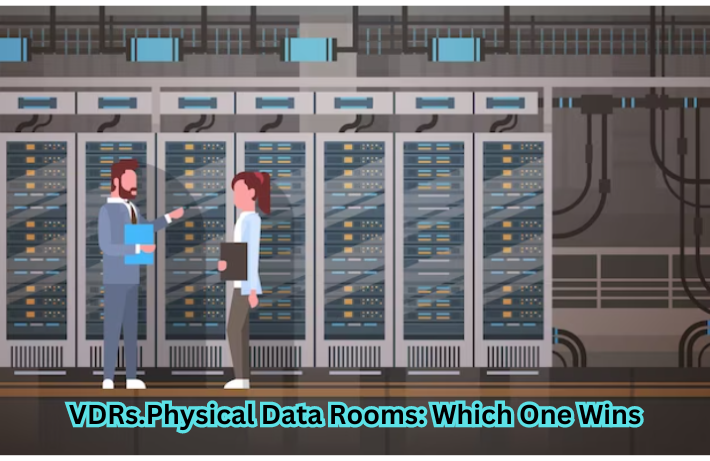Physical data room: The competition between physical and virtual data rooms (VDRs) has heated up in the dynamic world of corporate transactions and the interchange of sensitive information. Organizations are increasingly debating the merits of various safe and efficient private information management approaches. The article aims to help readers choose between virtual data rooms (VDRs) and physical data rooms (PDRs) by comparing and contrasting their advantages and disadvantages. Click here
The Rise of VDRs
Virtual data rooms (VDRs) have been game-changers when dealing with confidential material. Mergers and acquisitions, due diligence, and other high-stakes transactions can benefit from these online repositories’ safe platforms for storing and exchanging essential information.
Benefits of VDRs
Virtual data repositories (VDRs) offer unmatched accessibility, letting authorized users access documents anytime from any global location.
- Facilitated Teamwork: With real-time collaboration capabilities, several people may work together without a hitch, leading to better communication even in the most intricate deals.
- Superior Security: Virtual data repositories (VDRs) use cutting-edge security protocols to safeguard sensitive information from prying eyes. These protocols include encryption, multi-factor authentication, and document tracking.

“Unlocking the secrets: VDRs and Physical Data Rooms face off in a data management showdown.”
The Strengths of Physical Data Rooms
However, conventional, on-site places where participants meet to examine and exchange private documents are known as physical data rooms. Before the rise of the internet, these rooms were standard, and some companies continue to use them today.
Benefits of Real-Life Data Rooms
- Security in Material Form: Some parties find comfort in having tangible documents. Sometimes, the opportunity to handle and safeguard important documents physically is tempting.
- Direct Eye Contact: Negotiations may take a more human and trusting turn when parties meet face-to-face in a physical data room.
- The organizational body has full control over the physical area in a bodily data room. Thus, it may be set up any way they like, and extra security measures can be implemented.

“In-depth analysis: VDRs.physical data room – determining the clear winner.”
The Showdown: VDRs vs. Physical Data Rooms
Virtual data rooms (VDRs) are often less expensive when comparing the two types of data rooms. The latter may necessitate outlays for logistics, possible travel expenditures, and the rental of a secure location.
- Compared to the time-consuming Physical Data Rooms, Virtual Data Rooms (VDRs) expedite the due diligence, allowing quicker transaction closes.
- Human Error: Physical data rooms might easily have papers misplaced or unauthorized access granted due to security policy breaches. Virtual data records (VDRs) reduce these dangers because of automatic tracking and access restrictions.
An SEO Perk of VDRs
Discover the revolutionary impact of virtual data rooms on the world of safe information transmission.
- Learn why virtual data rooms (VDRs) are becoming more popular in today’s tech-driven corporate world and why they are displacing physical data rooms.
- Transaction Security: Virtual Data Rooms vs. Traditional Data Rooms: An in-depth look at the safety measures that make VDRs the best option for protecting sensitive data.
In summary, the physical data room
Thanks to the internet revolution, virtual data rooms (VDRs) have recently gained ground in competition with physical data rooms. Virtual Data Rooms (VDRs) are the go-to for modern companies because of their efficiency, affordability, and enhanced security features; Physical Data Rooms still have their uses. The shift from on-premises to cloud-based systems is becoming more than an option; it’s an absolute must in this age of soaring demands for safe and efficient data management. Finally, virtual data repositories (VDRs) are the most effective in today’s lightning-fast corporate world regarding data security.
FAQ VDRs.physical data room
Choosing the correct platform for managing sensitive information is crucial in the fast-paced corporate environment where data security is paramount. Physical and virtual data rooms (VDRs) are the two main players in this field. You are not alone if you are confused about choosing the best option. To assist you in making an educated decision regarding safe data management, this FAQ-style introduction will explain Virtual Data Rooms (VDRs) and Physical Data Rooms (PDRs) in plain English, answering frequently asked questions (FAQs). Alright, let’s get started.
What is a physical data room?
Companies often use a physical data room, a secure on-site location, to save and share sensitive documents during important transactions like mergers, acquisitions, or legal proceedings. A physical setup is required for the document review process.
What is a VDR in banking?
In banking, a “VDR” is a “Virtual Data Room,” a safe online space where banks and other financial organizations may save and share confidential data. Virtual data rooms (VDRs) simplify mergers, due diligence, and other private transactions in the banking industry.
What is VDR technology?
Virtual data rooms are a product of VDR technology, including all the features and tools that make them work. It has state-of-the-art security features, including document tracking, multi-factor authentication, and encryption. Virtual data room (VDR) technology is an attempt to offer a safe and effective setting for handling sensitive data.
What is a VDR solution?
A Virtual Data Room (VDR) solution is an all-inclusive software service that provides VDR features. Through its secure platform, companies may safely store, exchange, and collaborate on important documents while conducting transactions, guaranteeing the security and integrity of data.
What is the difference between a physical data room and a virtual data room?
What sets it apart is the structure and ease of obtaining it. All parties reviewing documents in a physical data room must be physically present at the same location. On the other hand, a virtual data room facilitates efficient and accessible document review and collaboration via secure internet access.
What is inside a data room?
A data room’s purpose determines what information it contains. A data room typically stores sensitive records about a business process or transaction. Financial accounts, contracts, legal papers, intellectual property records, and other relevant information may fall into this category.

